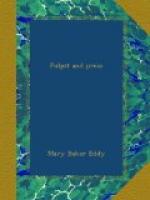There was no special sentence or prayer of consecration, but continuous services were held from nine to four o’clock, every hour and a half, so long as there were attendants; and some people heard these exercises four times repeated. The printed program was for some reason not followed, certain hymns and psalms being omitted. There was singing by a choir and congregation. The Pater Noster was repeated in the way peculiar to Christian Scientists, the congregation repeating one sentence and the leader responding with its parallel interpretation by Mrs. Eddy. Antiphonal paragraphs were read from the book of Revelation and her work respectively. The sermon, prepared by Mrs. Eddy, was well adapted for its purpose, and read by a professional elocutionist, not an adherent of the order, Mrs. Henrietta Clark Bemis, in a clear emphatic style. The solo singer, however, was a Scientist, Miss Elsie Lincoln; and on the platform sat Joseph Armstrong, formerly of Kansas, and now the business manager of the Publishing Society, with the other members of the Christian Science Board of Directors—Ira O. Knapp, Edward P. Bates, Stephen A. Chase,—gentlemen officially connected with the movement. The children of believing families collected the money for the Mother’s Room, and seats were especially set apart for them at the second dedicatory service. Before one service was over and the auditors left by the rear doors, the front vestibule and street (despite the snowstorm) were crowded with others, waiting for admission.
On the next Sunday the new order of service went into operation. There was no address of any sort, no notices, no explanation of Bible or their textbook. Judge Hanna, who was a Colorado lawyer before coming into this work, presided, reading in clear, manly, and intelligent tones, the Quarterly Bible Lesson, which happened that day to be on Jesus’ miracle of loaves and fishes. Each paragraph he supplemented first with illustrative Scripture parallels, as set down for him, and then by passages selected for him from Mrs. Eddy’s book. The place was again crowded, many having remained over a week from among the thousands of adherents who had come to Boston for this auspicious occasion from all parts of the country. The organ, made by Farrand & Votey in Detroit, at a cost of eleven thousand dollars, is the gift of a wealthy Universalist gentleman,




